San Marco is one of the six sestieri of Venice, lying in the heart of the city as the main place of Venice. San Marco also includes the island of San Giorgio Maggiore. Although the district includes Saint Mark's Square, that was never administered as part of the sestiere. The area is densely built and is now heavily touristed.
The small district includes many of Venice's most famous sights, including St Mark's Square, Saint Mark's Basilica, the Doge's Palace, Harry's Bar, the Palazzo Dandolo, San Moisè, the La Fenice theatre, the Palazzo Grassi and the churches of San Beneto, San Fantin, Santa Maria del Giglio, San Maurizio, San Moisè, Santo Stefano, San Salvador, San Zulian and San Samuele.
Saint Mark's Square
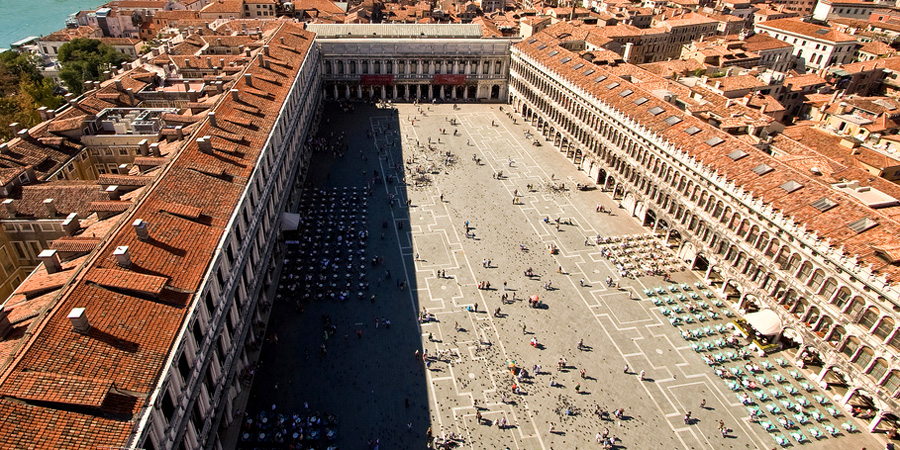
Piazza San Marco is Venice's only square. It consists of an artistic complex of buildings in different styles that over time have created a harmonious setting to the square. Piazza San Marco, the heart of Venice, is trapezoidal, and the Procuratie Vecchie and Procuratie Nuove run along the two extensive sides.
They are known as old (vecchie) and new (nuove) on the basis of the age of the buildings over the arcades of the ground-level porticoes. The monumental Piazza San Marco is composed of three areas: the Piazza itself, the area enclosed between the Procuratie Vecchie and Nuove and the Basilica; the Piazzetta, in front of Palazzo Ducale and the Library; and the Piazzetta dei Leoncini, overlooking the Patriarchal Palace, so named for two statues of lions delimiting the central area elevated.
The Doge's Palace
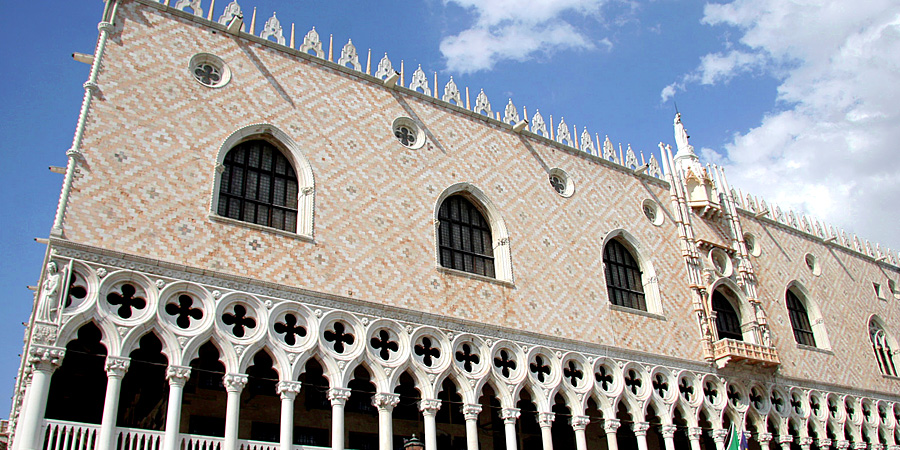
The Palazzo Ducale is the highest expression of Venetian art. It was the residence of the Doge and the seat of the main government departments. As one walks through the its rooms the glory of the Venetian Republic is revealed in its paintings and sculptures. The monumental entrance was the Porta della Carta, enchanting example of floral Gothic style.
The courtyard is surrounded by porticoes with a top loggia. On the eastern side there is the Scala dei Giganti. It is thus called because of the two enormous statues by Sansovino at the sides. The stairway goes up to the loggia but to reach the top floors we go up the Scala d'Oro. It owes the name to the lavish frescoes and gilded stucco work.
Saint Mark's Basilica
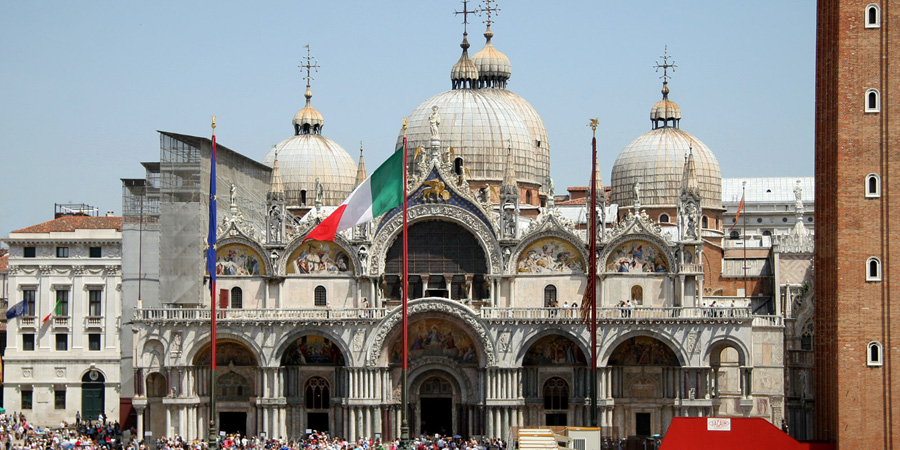
The Basilica di San Marco is the most famous of the city's churches and one of the best known examples of Byzantine architecture. It lies at the eastern end of the Piazza San Marco, adjacent and connected to the Doge's Palace. Originally it was the chapel of the Doge, but it was also the mausoleum for Saint Mark, the patron saint.
The life of Saint Mark is narrated in the golden mosaics on the walls. It has only been the city's cathedral since 1807, when it became the seat of the Patriarch of Venice, formerly at San Pietro di Castello. The Treasure of St. Mark's is the richest pieces of gold and silver, precious stones, ornamental glass and paintings, the most refined works produced for the churches and buildings of Constantinople and for the glory of St. Mark's by Venetian craftsmen. The most precious piece is the Pala d'Oro, the retable of the high altar of the church which glorifies San Marco and contains his relics.
The Procuratie and the Clocktower
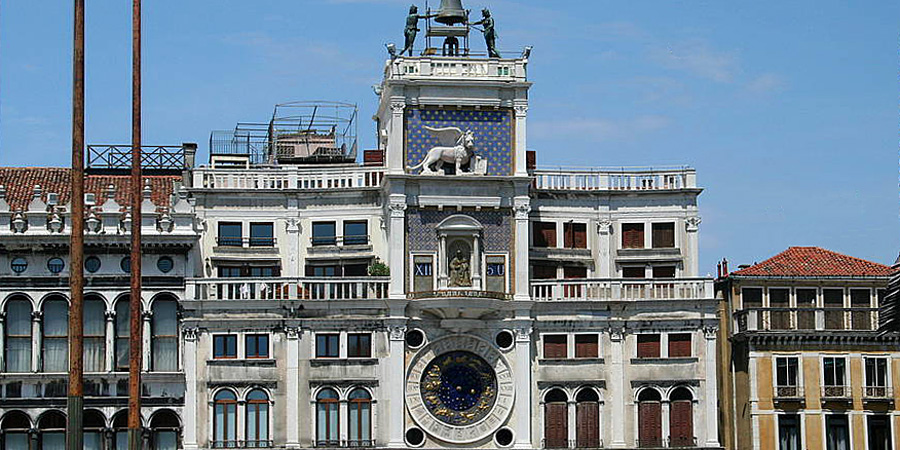
The Procuratie Vecchie runs along the north side of the square from the Torre dell'Orologio and have kept their Renaissance features. They are followed by the Ala Napoleonica, built in 1810 by the architect Giuseppe Soli, on the site of the demolished San Geminiano church, which was built Jacopo Sansovino.
The Procuratie Nuove runs along the west side of the square and includes the Libreria di San Marco which was designed by Jacopo Sansovino at the request of the Venetian Republic to house the codicils donated to it by Cardinal Bessarione. The Torre dell'Orologio or clocktower is at the start of the Merceria, the road that leads from Saint Mark's Square to the Campo di San Bartolomeo. The name Merceria refers to the many shops on both sides of it.
Museo Correr
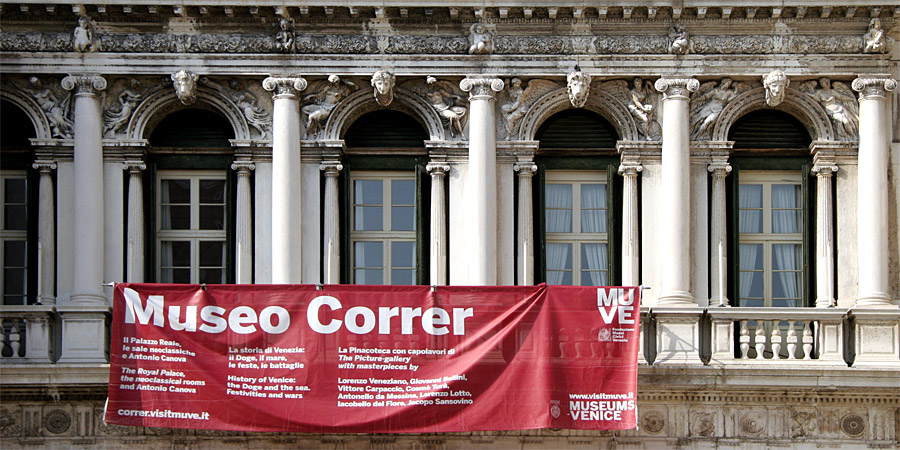
The Museo Correr is the civic museum located in the Piazza San Marco, facing the basilica of St. Mark that it partially occupies, and is entered by way of the Napoleonic wing of the bureaucratic buildings, or Procuratie, framing three-quarters of the piazza. The museum offers a fascinating insight into the art and history of Venice.
Upon leaving the Ala Napoleonica, just after the Bocca di Piazza, we come to the Chiesa di San Moisè. This originally eight-century building was rebuilt in the tenth century by Mosè Venier, who wanted to dedicate it to the saint after which he was named. We then come to Calle Larga XXII Marzo, built in 1880, and today this road is lined with shops as far as Bocca di Piazza. These shops were chosen by the most famous names in gold jewellery, leather goods and international and Italian fashion and offer for sale their latest and finest products.
La Fenice Opera House
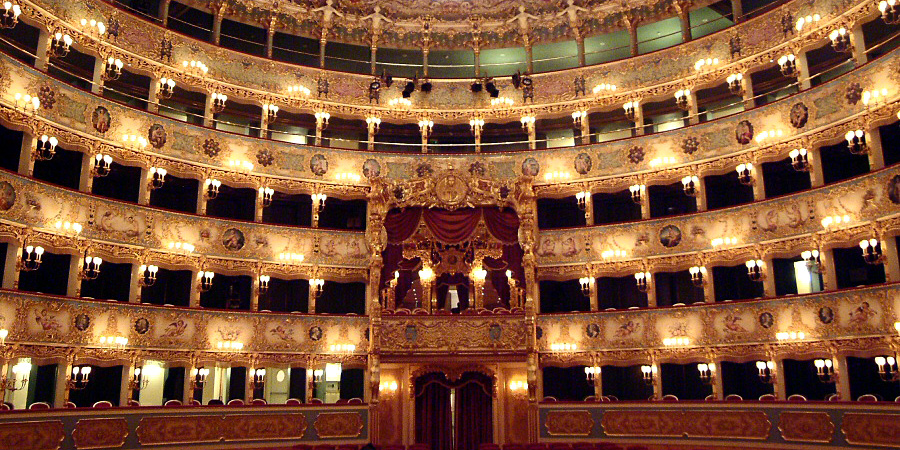
Halfway down Calle Larga XXII we turn right into Campo San Fantin where the Chiesa di San Fantin stands. This dates back to the ninth century but was rebuilt in the sixteenth century by Scarpagnino. Opposite, there is the Teatro La Fenice, the opera house. This was originally built in 1790 to a design by Selva.
It burnt down in 1836 but like the phoenix (fenice in Italian) it was rebuilt in the same style by Meduna in just over a year. The Teatro La Fenice reflected the spirit of Venice town. It was destroyed by a fire in 1996 but the determination of the Venetians brought it back the way it was in December 2003. It is one of the most famous theatres in Europe, the site of many famous operatic premieres. It's possicle to visit the theatre.
Church of Santa Maria del Giglio
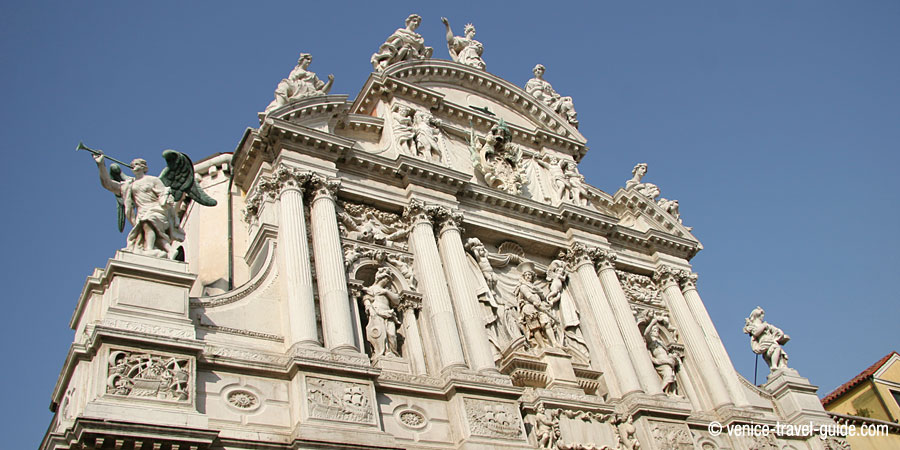
We come back into Calle Larga XXII Marzo and go on until we reach Campo di Santa Maria del Giglio with the Chiesa di Santa Maria del Giglio, more commonly known as Santa Maria Zobenigo. Zobenigo is a reference to the Jubenigo family, who had the church built in the 9th century, was rebuilt by Giuseppe Sardi for Admiral Antonio Barbaro.
The church was rebuilt between 1678 and 1681 and has one of the finest Venetian Baroque facades in all of Venice. The exterior has marble relief maps of various places in which Barbaro served, including Candia, Zadar, Padua, Rome, Corfu and Spalato. The inside is a single room decorated with the works of many painters from the seventeenth and eighteenth century.



